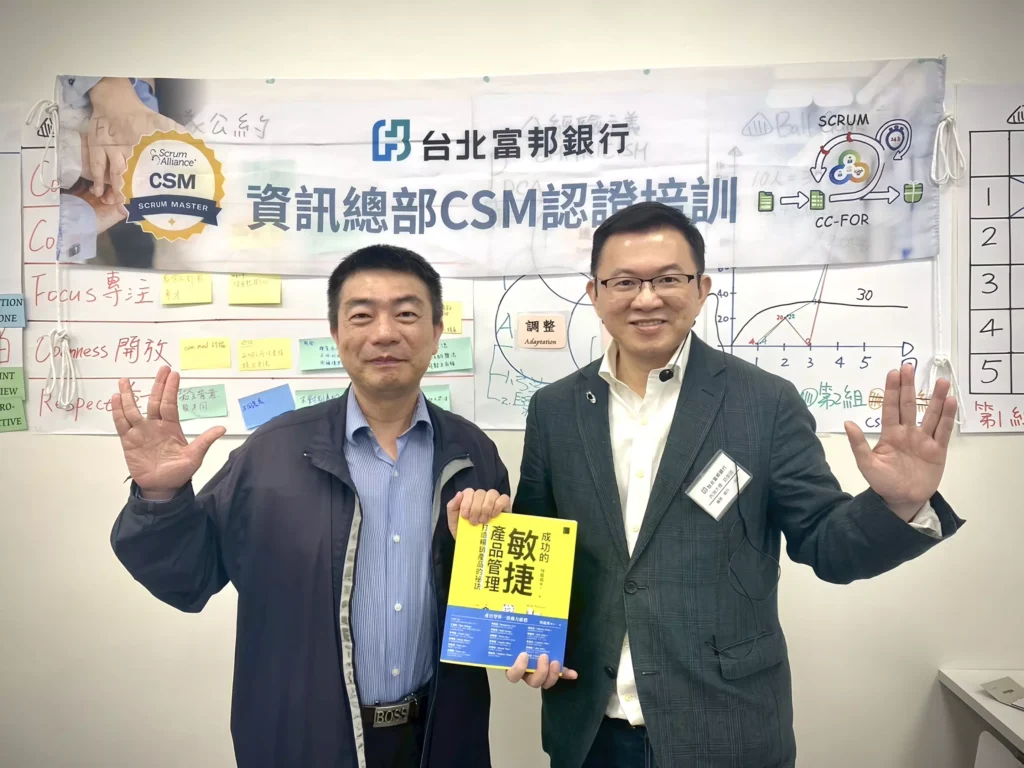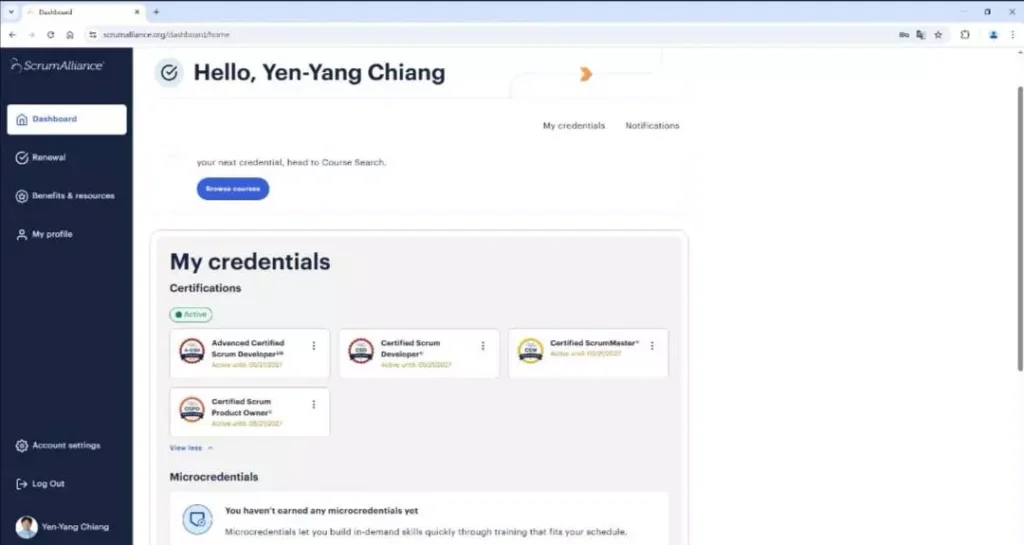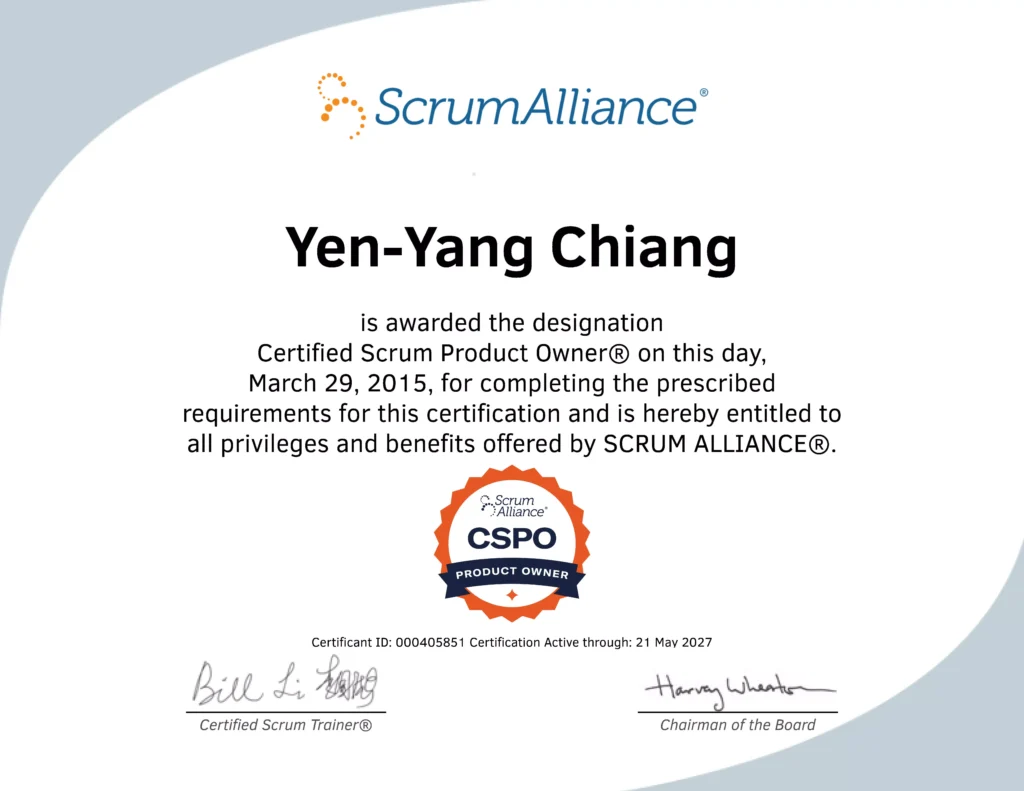This delightful discovery came about during the Fubon CSM corporate training program organized by Taipei Fubon Bank.
Mr. Yen-Yang Chiang, a senior manager in the Core Products and Corporate Banking IT Division at Taipei Fubon Bank, has been on this journey with me since 2014, when I first started learning Agile. He was among the very first group of students who joined me in attending a CSPO course taught by Coach Bill. Back then, I had rallied a group of like-minded friends, and he was one of those who responded to my “call to adventure.”
Yen-Yang is an exceptionally passionate lifelong learner. Even while working at a leading institution like Taipei Fubon Bank, he has never stopped striving for self-improvement. After earning his PMP and ACP certifications, he continued his journey by pursuing Scrum Alliance Agile certifications.
He earned multiple certifications from Scrum Alliance, including:
- First Certification: CSPO – as one of the very first students alongside me in Bill Li, CST’s class.
- Second Certification: CSM – through a course taught by Vernon Stinebaker CST.
- Third Certification: CSD – by attending Jacky Shen CST’s class.
All three certifications were obtained in 2015. In 2017, he completed his first renewal by paying 100 USD and accumulating 30 SEUs. However, he did not renew again afterward, and all three certifications officially expired in 2019.

Expired Certifications, Unexpected Comeback: A 2025 Course Awakens Long-Dormant Credentials
In 2025, as Taipei Fubon Bank prepared to host an internal CSM course, Yen-Yang was thrilled to learn that I would be teaching it personally. He exclaimed, “I’m coming back to experience Roger’s teaching style all over again!”
Ten years ago, I was still teaching PMP courses, which were primarily lecture-based. In contrast, today’s CSM courses are packed with interactive, hands-on experiences—completely different from the old days.
After the course, I helped him submit the course details. What followed was a delightful surprise:
- He didn’t need to upload any SEUs (Scrum Education Units). Typically, renewing would require around 50 SEUs—about 50 hours of learning.
- He didn’t have to pay the $175 renewal fee.
- He didn’t need to retake the CSM exam.
All he did was click “Accept Agreement,” and—just like that—all three of his expired certifications were instantly revived! Even more astonishing, a brand-new A-CSD (Advanced Certified Scrum Developer) certificate appeared in his account, despite him never having taken that course.
To Yen-Yang, it felt like a gift falling from the sky.
After I looked into it, I discovered that Scrum Alliance had upgraded the original CSD certification to align with the CSP (Certified Scrum Professional) learning path. As part of this transition, they automatically issued an A-CSD (Advanced Certified Scrum Developer) certificate to all existing CSD holders—essentially gifting it for free.

It’s worth mentioning that, initially uncertain about the renewal process, Yen-Yang went ahead and paid the $175 renewal fee. However, after discovering that his certifications could be revived simply by attending the CSM course, I reached out to Scrum Alliance on his behalf.
To our pleasant surprise, the issuing organization was incredibly supportive. Not only did they fully understand the situation, but they also proactively issued a full refund of the $175.
This gesture deeply moved Yen-Yang and clearly demonstrated Scrum Alliance’s genuine flexibility and commitment to supporting its learners.

Key Insights on Scrum Alliance Certification Renewal: 4 Essential Rules
After several rounds of communication with Scrum Alliance support, I’ve compiled the following four key rules that every Scrum Alliance certification holder should be aware of:
Rule 1: Scrum Alliance Certifications Have No “Revoke” Mechanism
Unlike the PMP certification, which follows a “3-year validity + 1-year grace period” model, Scrum Alliance certifications can be revived even after 5, 10, or 20 years of expiration. There is no time limit on how long a certificate can remain inactive.
To reactivate an expired certification, you simply need to:
- Pay the renewal fee (based on the number of active certifications)
- Submit the required SEUs (e.g., 20 SEUs for one certificate, 30 SEUs for two, and so on)
Once these steps are completed, your certification will be fully reactivated—no re-exam, no penalties, and no expiration deadline barrier.
Rule 2: Attending a CSM or CSPO Course Instantly Reactivates All Certifications
If a learner attends a CSM or CSPO course:
- All Scrum Alliance certifications will be simultaneously reactivated, even if they’ve been expired for many years.
- No renewal fee or SEU submission is required.
- No need to retake the CSM exam.
Simply complete the course and agree to the updated certification agreement, and all applicable certificates will be automatically renewed.
Rule 3: One Course, Multiple Certificates Reactivated Simultaneously
For learners like Yen-Yang, who hold three certifications, attending just one CSM or CSPO course allows them to:
- Save approximately $175 USD in renewal fees
- Avoid the time and effort of uploading and verifying 50 SEUs
- Receive an additional A-CSD certificate if they already have a CSD
This “complete reactivation” mechanism is a huge benefit for anyone with multiple expired certifications.
Just like in Yen-Yang’s case—by simply retaking the CSM course, all of his certifications came back to life after class, making it a truly rewarding and effortless return to the Agile community.
Rule 4: No Retest Required — Just Accept the Updated Agreement
As long as you’ve previously taken and passed the initial CSM exam, you do not need to retake it when reactivating your certification.
To regain your certified status, all you need to do is accept the latest Scrum Alliance agreement—no additional testing necessary.
One Refresher, 80% Revelation: How Has the Scrum Classroom Transformed After 10 Years?
Yen-Yang shared his reflections on attending the CSM course twice:
In 2015, when I first completed the CSM course, I probably understood only about 20%,” Yen-Yang recalled. “But this time around, I walked away with 80% insight.”
He specifically highlighted how my interpretation and demonstration of the Scrum spirit, especially regarding the timing and purpose of the Retrospective, helped him clear up a long-standing misconception. With a chuckle, he admitted:
“I used to think Retrospectives were something you held only at the end of a project. But the moment Roger started teaching, I realized they’re actually meant to happen at the end of every Sprint. That was a huge misunderstanding on my part—probably because I hadn’t worked in a real Agile environment.
This is a strong affirmation of Roger’s teaching style and content, and it also highlights the value of continuous learning and repeated practice on the Agile journey.
Further Confirmation from Customer Support and Website Evidence
I have included my conversation record with Rob Hill, a senior support manager at Scrum Alliance, along with official documentation from the Scrum Alliance website. You’re welcome to review them for a deeper understanding of the Scrum certification renewal policies. Below is Rob’s response:
1. Certification Reactivation and Renewal Policy
(Rob’s original statement + explanation)
“Anytime a student earns or retakes a Scrum Alliance certification course, this will provide an extension on any certifications they’ve earned in the past.”
Whenever a learner earns or retakes a Scrum Alliance certification course, the validity of any previously earned certifications will be extended.” — Rob Hill
Explanation: As long as you retake any Scrum Alliance certification course (such as CSM), all other certifications under your account—including expired ones like CSPO, CSD, or A-CSD—will be automatically reactivated and extended.
There’s no need to submit additional SEUs, and no renewal fees are required.
2. Refund Policy and Exceptions (Rob’s original statement + explanation)
“He shouldn’t have been prompted to pay or submit SEUS to renew… I can review his account and provide a refund for this renewal purchase.”
Explanation: If a learner has completed a new CSM course but is still prompted by the system to pay a renewal fee or submit SEUs to reactivate their old certifications, this is an unintended system error.
In such cases, Scrum Alliance will manually process a refund. As long as the instructor provides the learner’s email address, customer support can trace the account and issue the refund accordingly.
3. Additional Note: No Time Limit for Certification Renewal
“There is no limit to how long a certification can be expired to renew it… A member will never have their certifications revoked or removed if they choose to not renew.”
4. Exam Waiver Conditions and System Process
“He will not need to take the CSM test again since he already passed before… After he accepts the new license agreement, this will trigger the automatic renewal.”
Explanation: He does not need to take the CSM exam again because he previously passed it… Once he accepts the new authorization agreement, that will trigger the automatic renewal. — Rob Hill
5. Does the “never expire” mechanism also apply to advanced certifications such as CSP, CTC, and CEC?
“For CEC/CTC certifications, they don’t have the same penalties or requirements as mentioned above. They’re currently treated like non-trainer certifications such as the CSM, CSP-SM, CAL, etc.; you can let them lapse but they renew them later if you choose.”
Explanation: As for CEC and CTC, the current policy is more flexible. They are treated similarly to non-trainer certifications like CSM, CSP-SM, and CAL. These certifications may lapse, but can be renewed later without any penalty or requirement to reapply.
Student Benefit: PMABC Alumni Get 50% Off Refresher Courses — Full Certification Revival Included
If you’re also a Scrum Alliance certificate holder with multiple expired credentials, this is your perfect opportunity:
- Join Roger’s CSM or CSPO refresher course —
- at nearly half the original tuition. It’s a great chance to refresh your knowledge and experience a new teaching style.
- All your expired certifications will be seamlessly reactivated — no SEUs to upload, no exams to retake.
If you hold a CSD, you’ll also automatically receive the A-CSD — completing your certification path in one go!
If you’ve ever felt burdened by the renewal process, I hope this story brings you a spark of hope — don’t let your certifications lie dormant any longer. Now is the perfect time to wake them up.
You’re warmly invited to join the movement of alumni reviving and renewing their Scrum Alliance certifications!